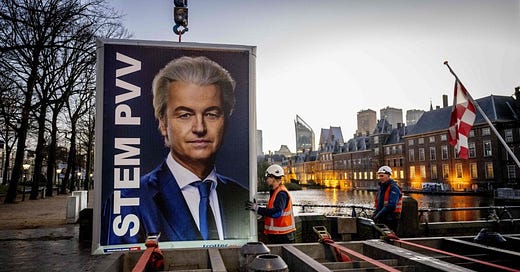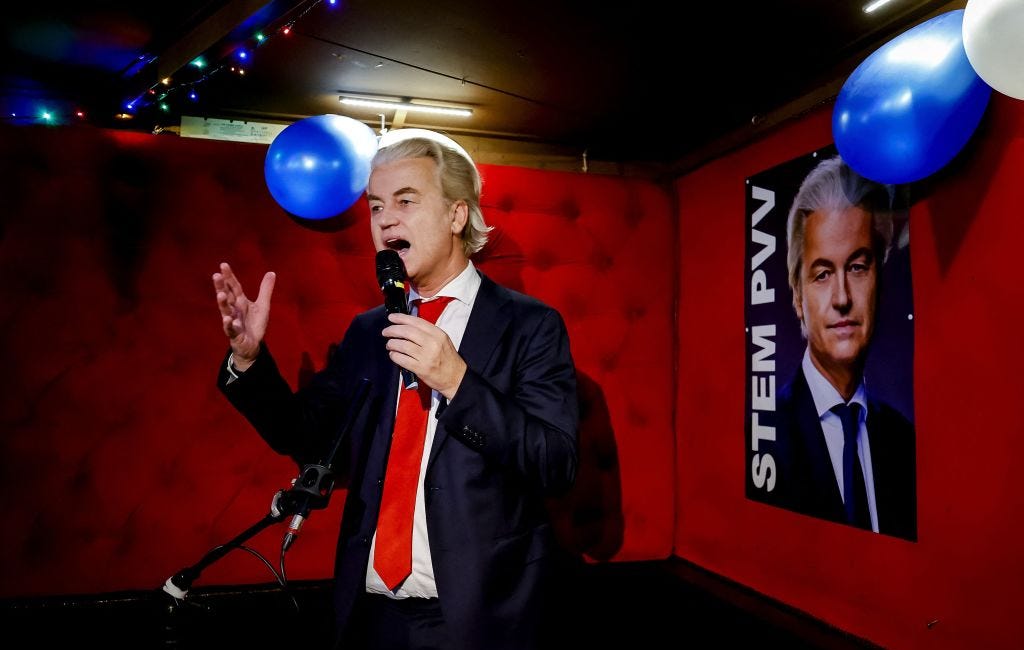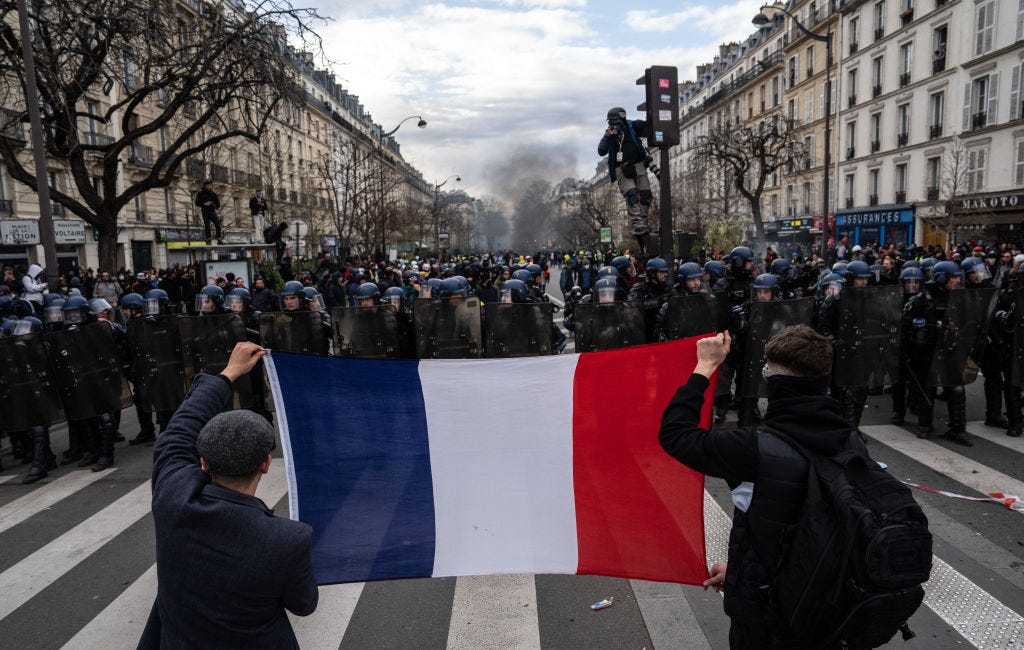
The Free Press

“Europe is in shock,” write Ayaan Hirsi Ali and Evelyn Markus in our lead story today.
The cause of that shock is the triumph of Geert Wilders in last week’s Dutch elections. That the anti-immigration populist now leads the largest party in the Dutch parliament is indeed a stunning outcome given his status as an outcast from the mainstream of Dutch politics.
But zoom out and his victory is entirely in keeping with a continent-wide trend. In Italy, Giorgia Meloni has been in office for a year. In Germany, the right-wing AfD party is rising in the polls. In France, Marine Le Pen is more popular than Emmanuel Macron.
In 2016, the twin electoral wins for Donald Trump and Brexit were said to herald the arrival of a populist moment. That was seven years ago. This populist moment now seems to be lasting an awfully long time.
And yet serious, good-faith examinations of why outsider parties are faring so well are hard to come by. Instead, we must wade through unhelpful, knee-jerk descriptions of everyone from an Argentine libertarian to an Italian Catholic national-conservative to a Dutch agnostic nativist as “Trump-like.” The comparison usually prefaces a shallow, parochial analysis.
In a post on the recent string of victories for radical right-wingers, the economist and blogger Tyler Cowen noted that “if you can’t talk about/think about/write about these developments without perpetually moralizing, it is hard to be an intelligent commentator today,” adding that “if your main theory here is ‘racism,’ your contribution to the discourse probably is negative.”
Cowen also suggests that since these parties keep winning elections, “you can’t call them ‘far right’ anymore! How about ‘deep center?’ ” I take the point, but I’m not sure that’s quite right either. But whatever we call Wilders et al., their impact on European politics is only growing.
Today, we offer two stories pegged to events on the other side of the Atlantic that offer more light than heat, helping us to understand a continent in revolt.
First, Ayaan and Evelyn explain the success of Geert Wilders through firsthand experience. They write that they are not shocked by his victory “because we are both Dutch—and because we both left the Netherlands because of the phenomena that have now brought Wilders to power.”
Read their piece here:
Europe is in shock. Geert Wilders—variously called “far-right,” an “anti-Islamist populist,” and the Dutch Donald Trump—won last Wednesday’s election in the Netherlands. His party is now the biggest in the Dutch parliament. For years, Wilders has been an outcast, considered too toxic by mainstream politics and too extreme by the overwhelmingly liberal media. And yet he has won—and not by a small margin.
Europe is in shock. We are not.
That is because we are both Dutch—and because we both left the Netherlands because of the phenomena that have now brought Wilders to power.
What we have witnessed will tell you not just about how Wilders could win a landslide victory in one of the most liberal countries in Europe, but about what could soon be coming to countries like France, Germany, and other liberal democracies who fail to grapple with the dual challenge of mass migration and assimilation and ignore the very real concerns of their citizens.
Our second piece is by the French thinker Christophe Guilluy, who says his country is in “economic, social, and cultural chaos” but that “there is one hope left. It is not a hope placed in politicians, or in intellectuals and certainly not in ideologues; rather it is one founded on the majority’s instinct for survival.”
Read his full essay, on how ordinary French people can save the French Republic:
I live in a country that has to deploy its army to defend the schools of some citizens, who are Jewish, from potential attacks by other citizens, who are antisemites.
I live in a country that has sacrificed the idea of the common good while fanning the flames of sectarian conflict—a country where communities live side by side, yet alongside one another, despite continuous appeals to the values of a “single and indivisible République Française.”
I live in a country where a powerless president observes that multiculturalism has failed, and that suburban and rural communities have become vulnerable.
I live in a country where around 60 percent of the population is now lucky to have 10 euros left at the end of the month and where eight million people (that is, one working-age person in four) is jobless, underemployed, or in precarious work.
I live in a country where industrial production now represents just 12 percent of GDP—a lower percentage than in Greece.
Honestly listeners will remember Renana, the Israeli mother whose two sons, aged 12 and 16, were kidnapped by Hamas terrorists on October 7 and who was interviewed on the podcast just a few days later. Some good news: 52 days later, her two boys have finally been freed.
Watch: In his latest video dispatch, The Free Press’s Tim Samuels reports from the West Bank.
Also on our radar. . .
→ Spies for Palestine: The Financial Times reports that the CIA’s associate deputy director for analysis posted an image of a man waving a Palestinian flag as her Facebook cover photo two weeks after Hamas’s attack on Israel. In a second post, the intelligence official posted a photo of herself with a sticker saying “Free Palestine” superimposed onto it. The official, who the agency confirmed to The Washington Free Beacon is Amy McFadden, is very senior and was once responsible for assembling the president’s daily brief. One former intelligence official told the FT that these posts “reflect exceptionally and surprisingly bad judgment.”
Also guilty of bad judgment: whoever is responsible for McFadden’s ongoing employment as an agent of the United States government.
→ Here come the Kochs: GOP 2024 hopeful Nikki Haley has won the endorsement—and, more importantly, the financial backing—of Americans for Prosperity, the Koch network’s PAC. The organization has promised to open its checkbook and help Haley defeat Donald Trump. But that will be a tall order. Haley might have some momentum, but Trump retains a huge lead in the polls with the Iowa caucuses around six weeks away.
→ Puberty blockers not blocked: Last year, the UK signaled an about turn on youth gender medicine. The NHS limited the prescription of puberty blockers to clinical trials, and Tavistock, a prominent gender clinic, was closed. And so you might think that far fewer British kids are being prescribed puberty blockers now than they were a few years ago.
But, in fact, The Telegraph reports that the number of children being prescribed puberty blockers doubled in the 12 months to July 2023 compared to the previous year.
→ America under fire: Over the weekend, the USS Mason, a naval warship, was attacked by two ballistic missiles fired from the Houthi-controlled part of Yemen. This was just the latest in a series of recent attacks by the militant group. More broadly, U.S. troops in the region have been under sustained attack since October 7. One estimate puts the number of attacks at 73.
National Review’s Noah Rothman notes this sustained aggression by Iranian-backed proxies as an alarming sign that attempts to reassert deterrence without triggering further escalation have not worked. “The United States is under attack,” writes Rothman. “The Biden administration’s unwillingness to acknowledge this unsustainable reality won’t make it disappear.”
→ But don’t bet against America!: Two examples from recent days serve as reassuring reminders of our nation’s greatness.
First, there’s education secretary Miguel Cardona, who botched a Reagan quote in spectacular fashion on Monday: “I think it was President Reagan who said, ‘We’re from the government. We’re here to help,’ ” mused the man who oversees the molding of young American minds. (The correct quote, of course, is: “The nine most terrifying words in the English language are: I’m from the government, and I’m here to help.”)
Second, the national Christmas tree toppled over in high winds in Washington on Tuesday evening, two days before Joe Biden was set to turn the lights on. The most powerful nation in human history. But one that can’t keep the Christmas tree on the lawn of the White House standing during a few November gusts.
Oliver Wiseman is a Free Press editor and writer. Follow him on X @ollywiseman.
Become a Free Press subscriber today:






















It's funny/pathetic that the people eager to exclude entire parts of the democratic debate by smearing them in "-isms" and "-phobia" are doing so in the name of the defense of democracy.
The irony is palpable
We truly need to give at least one country entirely to the Far Left and let them run their utopian experiment unfettered. Then, in six months when EVERYTHING is on fire and everyone is naked and eating each other and they come to us apologizing that they were wrong....oh never mind. That won't happen.